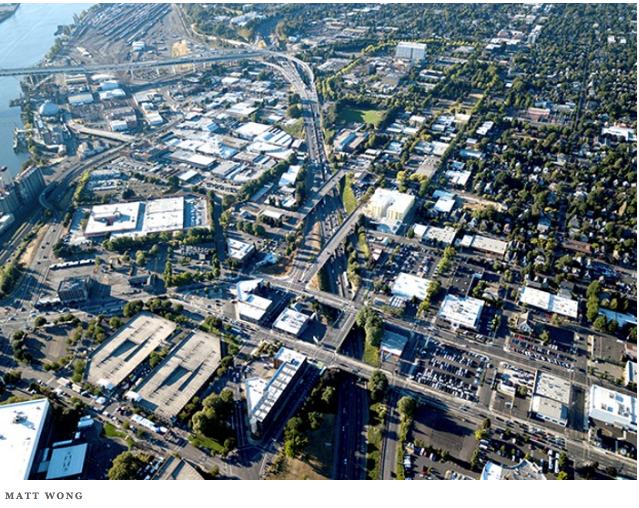
What once looked like it might be a bold statement from Commissioner Dan Saltzman on tolling Portland interstates has softened to a whisper.
With activists, economists, and a variety of environmental and transportation groups forming up against a $450 million plan to widen Interstate 5 in the Rose Quarter, Saltzman's office suggested in August he'd been swayed by the group's thinking.
Rather than pressing full speed ahead with the plan, which we detailed at length in a September story, the city's transportation commissioner was supposedly convinced state officials should try tolling I-5 (and I-205) before widening the freeway. Critics have argued that "congestion pricing"—where costs for using highways rise and fall with demand—is the most promising means of solving Portland's worsening traffic woes.
The city doesn't have much say in what the Oregon Department of Transportation does with the project, but the thinking as of early September was to put forward a "strongly worded" statement that Portland's city government would like to see congestion pricing go into effect before any widening occurred. According to draft language Saltzman's office sent us on August 31, the resolution would have called for "congestion/value pricing before the project breaks ground to ensure maxim congestion relief and overall environmental benefits."
City council is scheduled to take up the resolution [pdf] Saltzman wound up with this afternoon, and "strongly worded" probably isn't an accurate descriptor.
While signaling support for congestion pricing, stating traffic congestion had grown by 13.6 percent between 2013 and 2015, and arguing that such activity runs contrary to Portland's climate change goals, the resolution council appears likely to pass doesn't actually do much—and certainly doesn't alter the trajectory of the I-5 Rose Quarter project in the least (or even mention the project by name).
So what does it do?
First and foremost the resolution orders the Portland Bureau of Transportation "to work with the Oregon Department of Transportation with all available capacity" in following the state legislature's direction on congestion pricing. As part of a $5.3 billion transportation package passed earlier this year, ODOT is required to pursue federal permission to toll parts of I-5 and I-205 by the end of 2018. There's a newly convened committee trying to figure out what that might look like.
The bill that mandated that study is the same one that mulls payments of $30 million a year from state coffers to pay for the I-5 project. Assisting with the effort amounts to assisting with the status quo.
The resolution also asks PBOT and the city's planning bureau to draw some of their own conclusions about what tolling could for should look like. The bureaus are directed to "propose comprehensive congestion pricing and demand management strategies," which could include parking demand management and other policies that go further than ODOT's mandate. They're also charged with assuring that any policy proposals are equitable, and in step with the city's goals for climate change and reducing road deaths.
And that's it!
Update, 1:59 pm: I was chatting with Gerik Kransky of the Street Trust in City Hall, and he thinks there's more in the resolution than I've described above. Kransky says the resolution could be seen as granting permission to city bureaus to explore a wide-range of strategies to curb demand. He specifically talks about a mention of traffic cordons, which he thinks could lead to exploration of congestion policies like those used in London.
Original post:
To be clear, Saltzman has signaled for months that he supports a full build out of the I-5 project, so it's hardly surprising he's elected to take a softer stance than initially expected. It's worth pointing out, too, that if council passes this today, the City of Portland would be putting down a marker of support for tolling. A program in Portland would be Oregon's first.
"It’s basically to help support ODOT's efforts and give them the political backing and say, 'The largest city in the state wants you to do this,'" Matt Grumm, Saltzman's point person on transportation policy, told the Mercury last week. "We didn't want it to be a poison pill for any big state project. We’ll definitely hear at the council meeting from people who don't like that."
He's right. The group No More Freeways Expansions in recent days has been rallying its followers to attend this afternoon's council session.
Red Alert: Commissioner @dansaltzman dropped language about freeway expansion from his congestion pricing resolution. Read our letter and help us push back before tomorrow's hearing: https://t.co/Hnd9kOwPIg pic.twitter.com/A7HzMFy1LM
— Congestion Pricing Before Freeway Expansion. (@nomorefreeways) November 29, 2017
The group plans to push for an amendment to Saltzman's resolution that reads:
“The City of Portland does not support moving forward with planning, design or construction of the I-5 Rose Quarter project or any freeway expansion within city limits until after congestion pricing has been implemented and its effects evaluated.”
No More Freeway Expansions isn't alone in its point of view. The Sightline Institute, a Seattle think tank, wrote this week in support of the groups' point of view.
Anyway. This afternoon's hearing begins at 2 pm. You can watch it here.


















